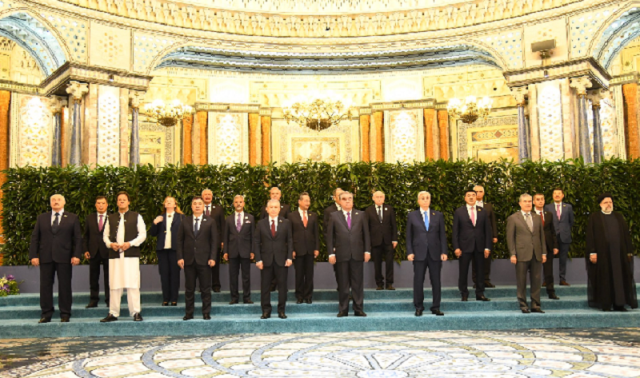SCO leaders ask US to engage with Taliban
US, allies urged to bear responsibility of post-conflict Afghan reconstruction

Pakistan, Russia, China and Iran on Friday asked the United States and its Western allies, which were part of the 20-year-long war in Afghanistan, to bear “primary responsibility” for the post-conflict reconstruction of Afghanistan.
The leaders called on the US to engage with the Taliban, though they also urged the new Afghan rulers to yield power to a more inclusive government, remain peaceful to neighbours and combat terrorism and drug-trafficking.
The calls were made by the leaders, while addressing the summit meeting of the Shanghai Cooperation Organisation (SCO) – an eight-member regional alliance, also including four Central Asian states, as well as India – held in the Tajik capital Dushanbe.
In a joint statement after the foreign ministers of these immediate neighbours of Afghanistan met on the sidelines of the SCO summit to discuss the current situation in Afghanistan. While they delivered a message to the US and its allies, they also asked Afghan Taliban for an inclusive government.
Addressing the summit via a video link, Russian President Vladimir Putin said the SCO should “use its potential” to “stimulate the new Afghan authorities” in fulfilling their promises on normalising life and bringing security in Afghanistan.
Putin called on Washington to unfreeze assets of the Afghan central bank, which have been blocked since the Taliban takeover, saying without access to the funds, Afghanistan’s new rulers would be tempted to turn to the drugs and arms trade.
“The main part of the expenses related to Afghanistan’s post-conflict rebuilding should be borne by the United States and NATO countries, who are directly responsible for the grave consequences of their prolonged presence in the country,” Putin said.
He said that a hasty withdrawal of the US-led forces left behind “an open Pandora’s box full of problems related to terrorism, drug trafficking, organised crime and, unfortunately, religious extremism”. He urged the partners to work with the new Afghan government, even if it was not representative.
Putin’s views were echoed by his Chinese counterpart, Xi Jinping. Without mentioning the United States by name, XI said that “certain countries” should assume their due responsibilities for Afghanistan’s future development, having been “instigators” of the situation.
Like Putin, Xi also spoke via a video link. He said that it was necessary to “encourage Afghanistan to put in place a broad-based and inclusive political framework” and to “resolutely fight all forms of terrorism” and live in peace with its neighbours.
Most of the summit leaders were also cautious about Afghanistan’s new interim cabinet, formed almost exclusively of ethnic Pashtuns. Putin noted that the new government was only provisional. “One cannot call it representative or inclusive… but we believe we need to work with it.”
However, Prime Minister Imran Khan hailed “a rare opportunity to end 40 years of war in Afghanistan,” while also urging the Taliban to ensure representation of all ethnic groups in its government. He encouraged the Taliban to create an “inclusive political structure” representing all ethnic groups.
Imran said the priority was to prevent a humanitarian crisis and an economic meltdown. “We must remember that the previous government depended heavily on foreign aid and its removal could lead to economic collapse.” He urged the Taliban to prevent Afghan soil from being used for militancy.
Read Time to acknowledge Afghanistan's 'new reality', says PM at SCO
Earlier, while complaining of a build-up of militant groups along the 1,357-kilometre border with Afghanistan, Tajikistan President Emomali Rakhmon, the host of the summit, called for “a reliable security belt around Afghanistan (to prevent) the potential expansion of terrorist groups”.
The Afghanistan-dominated Dushanbe summit also saw SCO members backing long-time observer Iran’s future membership. Iranian Foreign Minister Hossein Amir-Abdollahian said joining the bloc would have an “important impact” on Tehran’s cooperation with the countries.
Joint statement
In the joint statement, the foreign ministers from Afghanistan’s neighbours also stressed the importance of engaging with those states, which should bear primary responsibility for post-conflict socio-economic reconstruction in Afghanistan.
Despite spending a whopping $2.3 trillion in the US-led war in Afghanistan for 20 years, Afghanistan’s economy is on the verge of collapse with looming humanitarian crisis. The minister urged the war allies to provide Afghanistan with urgently needed economic, livelihood and humanitarian assistance.
The ministers reaffirmed their intention to promote peace, security and stability in Afghanistan and in the region as a whole. They emphasised that the sovereignty, independence and territorial integrity of Afghanistan should be respected.
“The basic principle of ‘Afghan-led, Afghan-owned’ should be implemented, and the rights to pursue peace, stability, development and prosperity by the Afghan people should be maintained,” read the joint statement. The ministers noted the need to conclude national reconciliation in Afghanistan.
Given the security challenges emanating from Afghanistan, they stressed the need for coordinating efforts to counter threats, especially the spread of terrorism and drug trafficking, in order to ensure regional stability and address legitimate concerns and interests of neighbouring states.
The ministers expressed their concern over the precarious humanitarian and socio-economic situation in Afghanistan, as well as the risks of a possible refugee influx in the region. They stressed the need for restoring peaceful life and economic recovery of the country.
They called on the international community to continue providing humanitarian assistance to Afghanistan on urgent basis. They decided to continue coordination between Russia, China, Pakistan and Iran on Afghanistan and meet at the ministerial, special envoy and ambassadorial levels in due course.
(WITH INPUT FROM AGENCIES)



















COMMENTS
Comments are moderated and generally will be posted if they are on-topic and not abusive.
For more information, please see our Comments FAQ